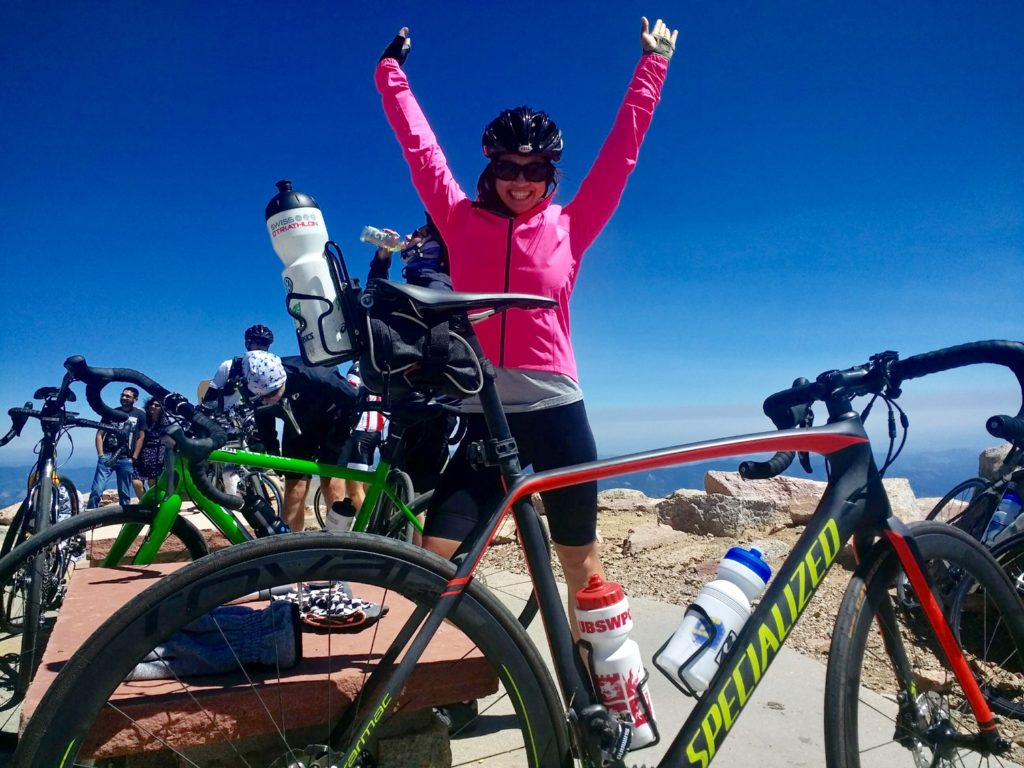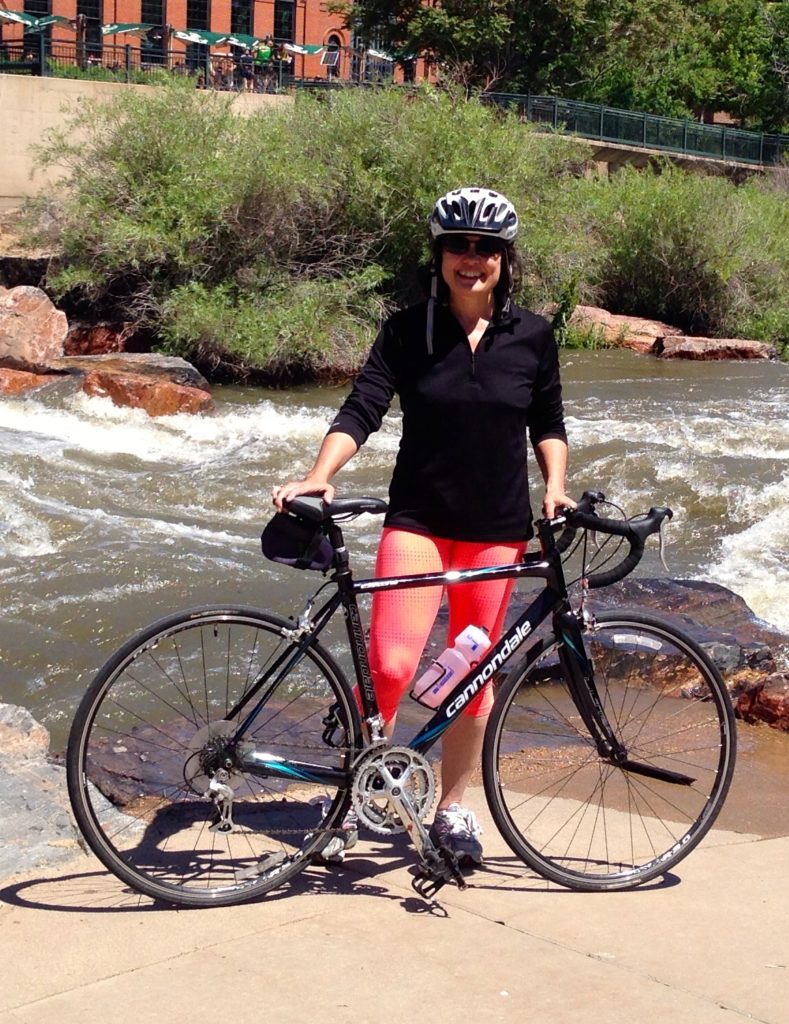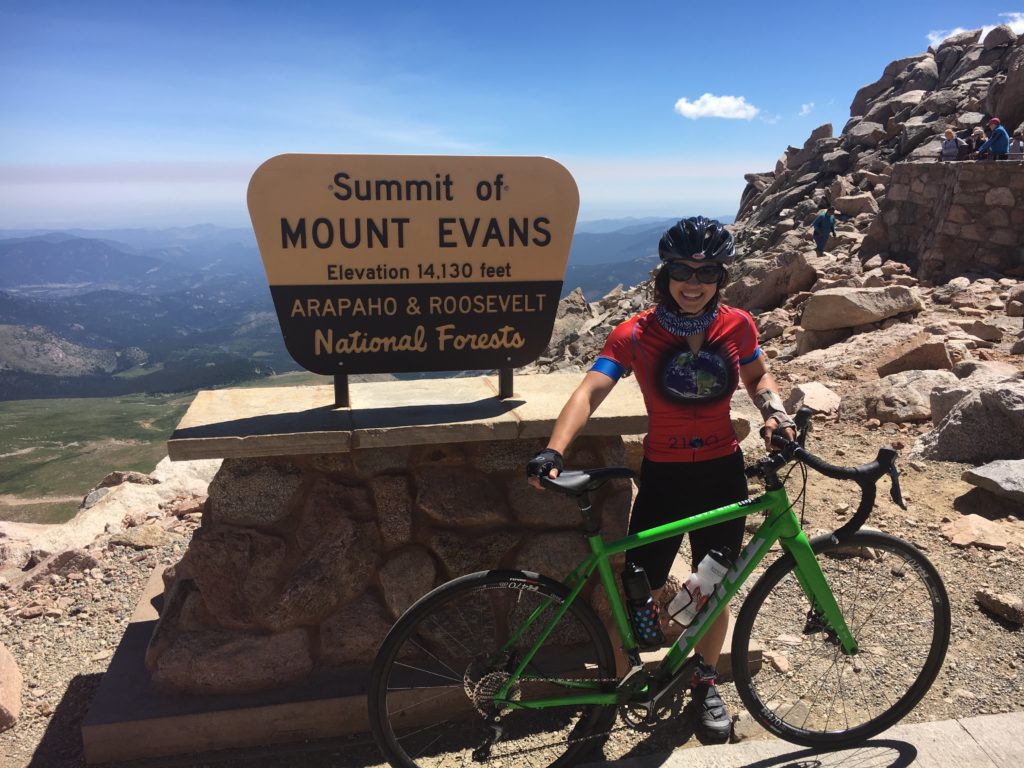 Melissa and Natalie Valentin are a mother-daughter duo devoted to sports and biking for the planet. But, with wildfires raging across the West and a president actively reversing our country’s progress on climate change, they have been finding it very hard to be hopeful about the future of the planet lately. Rather than give in to climate despair, they joined Climate Ride Colorado in order to meet other inspiring riders and to become a part of the Climate Ride community. They were looking to reinvigorate their optimism and activism by raising money for charities working on climate (one antidote to a lack of spending on our government’s part) and surrounding themselves by similarly committed activists. The week of mother-daughter time was supposed to be icing on that cake.
Melissa and Natalie Valentin are a mother-daughter duo devoted to sports and biking for the planet. But, with wildfires raging across the West and a president actively reversing our country’s progress on climate change, they have been finding it very hard to be hopeful about the future of the planet lately. Rather than give in to climate despair, they joined Climate Ride Colorado in order to meet other inspiring riders and to become a part of the Climate Ride community. They were looking to reinvigorate their optimism and activism by raising money for charities working on climate (one antidote to a lack of spending on our government’s part) and surrounding themselves by similarly committed activists. The week of mother-daughter time was supposed to be icing on that cake.
Activism runs in the family for the Valentins.
Both mother and daughter have made climate change a focus in their lives. Natalie has attended a number of community-organized conferences on the intersections between gentrification and environmental issues, and how we can make sure cities include ALL neighborhoods in sustainability initiatives. She has also worked in a variety of environmental fields – energy efficiency, environmental stewardship, environmental education, and sustainable food systems. Natalie studied Environmental Policy, and channeled her drive into organizing city-wide beach cleans in Chile, leading groups of volunteers on trail building projects in the San Juans, and selling energy efficiency solutions to building owners. Then she heard a few colleagues rave about their experiences with Climate Ride, so she decided to give it a go and convinced her mom to join her! Melissa has made science her career and like many scientists in the US, she has been scrambling to replace climate change research funding that has been stalled or eliminated. She researches the effects of climate change on watersheds in cold regions and consults with businesses to help them understand how their operations are impacted by weather and climate change. This lack of funding interrupts critical ongoing research and careers. The administration’s budget plan for 2019 includes cuts to funding for environmental projects and research that is 70% below the average spending of the previous administration according to the New York Times. While some hope that Congress will mitigate these cuts as they did for 2018, overall, spending for environmental research and especially climate change is decreasing rapidly despite the growing impact of climate change. Melissa is acutely aware of how climate change is having a dramatic impact on Western US forests and watersheds.
Melissa is acutely aware of how climate change is having a dramatic impact on Western US forests and watersheds.
Because of her scientific background and career, she has been tracking the effects of climate change. According to Melissa, starting around 2002, warmer winters enabled bark beetles in the Rocky Mountains to overwinter, and longer summers enabled them to double their reproduction rate. This, combined with forest stress caused by a multi-year drought, led to an unprecedented bark beetle outbreak that decimated Rocky Mountain forests. The West is experiencing larger and more frequent wildfires, associated with drier and hotter summers. As of four days before the start of Climate Ride Colorado, much of the route was under an air quality advisory due to wildfires. Fortunately, due to a weather change, much of the smoke cleared out, but smoke-free summers and falls have become less common across the West.
Additionally, the timing of streamflow that originates in the snow-dominated headwaters of Colorado is changing, with more winter rain and earlier snowmelt. Ski resorts in Colorado are diversifying to include warm-season recreational activities due to the shorter ski season. The effect of climate change in Alaska (the focus of Melissa’s research) is even more profound because temperature rise there is four times greater than the global average, causing a dramatic loss of glacier ice and permafrost. Meltwater from Alaska’s glaciers are important contributors to sea level rise, and salmon may be impacted as glacial meltwater changes the timing and quantity of streamflow. As permafrost thaws, infrastructure becomes unstable, soil dries out, hydrologic pathways change, and previously stored carbon is released to the atmosphere. That’s why Melissa decided to get back on her bike after a long break and raise money to combat climate change. She rode to support the Union of Concerned Scientists because, as she put it “they stand up for integrity in science, policy, and democracy.”
Natalie has put a lot of energy into working against the outsized impact of climate change on our most vulnerable communities. She knows resiliency planning is critical to ensure that everyone in our communities, not just those with the most money or political sway, will have access to healthy food, water, and pollution-free neighborhoods. According to the UN, “Families living in poverty systematically occupy the least desirable land to damage from climate hazards, such as mudslides, periods of abnormally hot water, water contamination and flooding. Climate change has the potential to worsen their situation and thereby worsen pre-existent inequalities. ” That’s why Natalie chose to ride on behalf of Denver Food Rescue. DFR’s bike-powered volunteers rescue fresh produce from grocery stores and community gardens and deliver it to No Cost Grocery Programs in 20 underserved neighborhoods. They pull this off with only 3 full-time staff thanks to their resourcefulness and an army of dedicated volunteers. Their Board of Directors is comprised of residents of their partner communities, which ensures that food justice and health equity stay central to their mission, alongside the environmental impact of reducing food waste.
Without change, these cycles of dryer summers, more fire, and invasive species will continue to become more severe. That reality alongside a diminished effort on the part of our government institutions is enough to drive most of us towards despair. But motivation and hope weren’t the only obstacles that Melissa and Natalie faced in taking on this 250-mile ride with 20,000 feet of vertical gain up and down the rocky mountains.

These intrepid bikers also overcame physical and mental blocks to get ready for Climate Ride Colorado.
In May, Natalie tore a tendon in her wrist while rock climbing. Her doctors said the injury would take 4-5 months to heal completely and prevented her from riding for a number of weeks. For a while, she was constrained to stationary bikes where she could rest on her forearms instead of gripping the handlebars while training. With the help of a burly wrist brace and an awesome occupational therapist, she got back on her bike at the end of June, giving her just about a month of on-the-road training for the ride. She’s developed a goofy tan line from her brace, but she feels it’s worth it. Melissa also saw the ride as a way to overcome a fear of biking that followed a serious bike crash in 2013. Before she started training for Climate Ride Colorado, just the thought of biking downhill made her re-experience the crash and brought her to tears. But her drive to raise awareness and money for climate research pushed her past her fear. She knows how crucial that work is, and felt it was more important than her fear of biking. After easing back into riding, she is happy to report that she is totally at ease on her bike again.
Building a community around the fight for our climate keeps us rolling even when the climb looks too steep.
Both mother and daughter told us that community was something they hoped to find on Climate Ride before they left. They were hoping to meet “other people who are willing to work hard and volunteer their time to raise money for environmental research.” Being connected to a wider community advocating for climate research and support of environmental non-profits helps lift the tide of hope when things are looking bleak. Everyone here at Climate Ride knows the power in this community every time we go out on one of our events, but we’re always hopeful that riders have the same experience. So when we followed up, Melissa passed on Natalie’s thank you email to her donors. We decided to quote it extensively here because we think it gets to the heart of what we want Climate Rides to do for the community:“The landscapes were stunning and the physical challenge was rewarding, but the people, most of all, blew me away. Our fellow riders were intelligent, positive, curious, driven, encouraging, welcoming, hilarious, quirky as hell, and astoundingly kind. I had many reasons for participating in the Climate Ride: to fundraise for Denver Food Rescue; to raise awareness for climate change, sustainable transportation, and community resilience; to embark on an exciting adventure with my Mom; and, hopefully, to motivate others to take personal action on behalf of our planet. On a more personal level, I also signed up for hope. The state of our planet is scary, and the state of our politics is even scarier. Too often, I catch myself slipping into cynicism and pessimism. I signed up for the Climate Ride in order to unplug, reflect, recharge, and re-energize. Thanks to the beauty of Colorado, and the inspiring work and stories of my fellow riders, I found what I was looking for.”-Natalie Valentin
